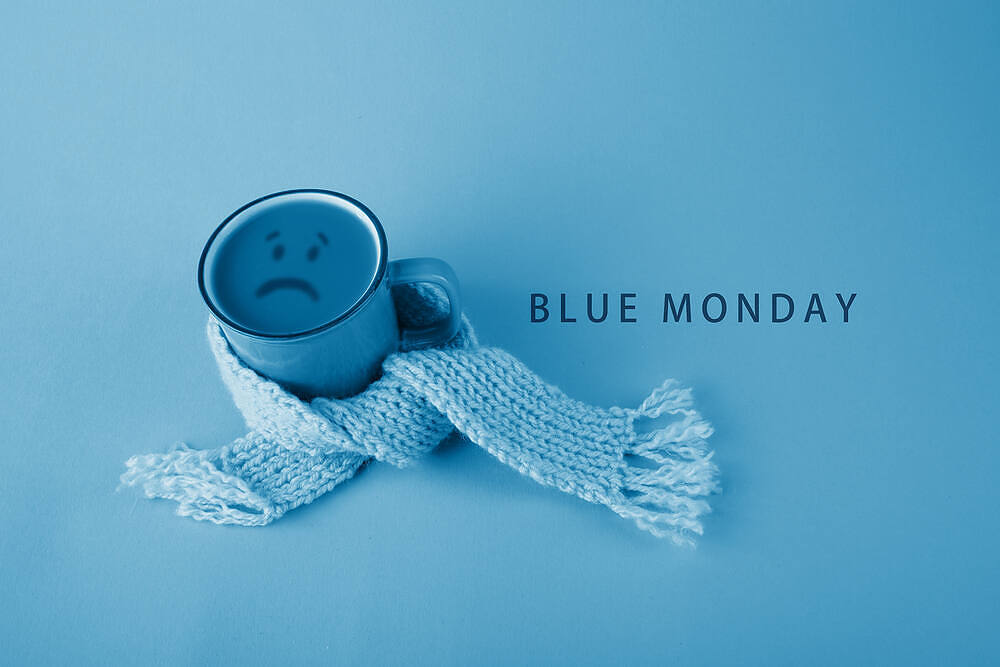
The fabled ‘most depressing day of the year’ Blue Monday is a pseudo-scientific theory that the third Monday of January is the day of the lowest mood throughout the UK population.
The claim is heavily disputed although there is some suggestion that the combination of difficult factors in January in the UK may lead to a period of general low mood.
When is Blue Monday?
In 2024, this date will be the 15th of January. This is early by the standards of recent Blue Mondays. Obviously, the exact date varies each year, but the calculation means that it almost always falls in the middle of the month.

Is Blue Monday Real?
No, the consensus is that Blue Monday was invented as a marketing ploy to encourage spending to improve mood. It is interesting to note that Blue Monday is bang in the middle of the worst period for retail sales annually, from January to February.
The formulas offered vary here are two options, one released in 2006 and the other in 2009 with similar ideas. However, the formula has little or no basis in any studies or statistics and is simply the brainchild of Dr Cliff Arnall who was a psychologist and former tutor at Cardiff University.
Dr Arnall claimed he developed the idea to help motivate people to overcome the depression associated with SAD and financial strain in January.
The formula Blue Monday was based on an intriguing mix of factors commonly associated with low mood in January. W = weather D = debt d = monthly salary T = time since Christmas Q = time since the failure of New Year’s Resolutions M = Low motivation and NA = Need to take action.
![The formula Blue Monday {displaystyle {frac {[W+(D-d)]times T^{Q}}{Mtimes N_{a}}}}](https://wikimedia.org/api/rest_v1/media/math/render/svg/6cbe5fc08ae0e9e3e314600fdfb591f18ada6fab)
- Climate
- Financial Stress
- Time since Christmas & New Year
- Failure of New Year’s resolutions
- Need to take action
The formula has been criticised for lacking quantifying information, such as the scale used to determine ‘weather’ and ‘motivation’. Also, mathematicians noted that even if the scale is known, the formula does not make sense, with some factors all but guaranteeing depression or lack of it, which is not empirical or realistic.
Despite being debunked by scientists and mathematicians, the formula proposed by Arnall highlights some important factors in low mood and spending in January.
SAD and financial stress in January – February account for general increases in depression. The imbalance of lower levels of serotonin and higher levels of melatonin can leave people feeling both down and unmotivated.
Blue Monday and Alcohol
The relationship between alcohol and seasons is intriguing. Statistically, people in the UK drink more overall in the summer than in winter.
However, December is the exception to this rule, with the period around Christmas and New Year showing the most drinking going on. This binge over a short period, often followed by a sudden drop again, can have serious consequences for our mental health.
Drinking alcohol, especially in large quantities, can improve our immediate mood. But it slowly replaces natural happiness chemicals in the brain, leaving us more down when we stop drinking than we were before we started.
Alcohol-related mood problems are at their peak a week or two after we stop drinking. This would put most people who have binged over the holidays at the worst point around a few weeks after New Year’s. This might explain why people are feeling down as well.
Financial Stress in January
More than half of the UK population surveyed say that they find January to be the most stressful month financially.
Overspending on Christmas gifts and events alongside holidays and reduced working hours for those on an hourly basis can lead to serious debt and financial dire straits in the period just after New Year.
The rising cost of living has made the situation more difficult. Alongside this are the challenges of the COVID-19 years and the desire to make up for lost time in lockdown by splashing out more.
One in ten people now feel this has been the toughest January yet when it comes to financial stress.
Blue Monday and SAD (Seasonal Affect Disorder)
By January, the shortest day has passed, but we are still in the thick of SAD and the associated low mood.
SAD is a condition that impacts many people living in parts of the world where light is reduced significantly during winter. This can leave people feeling lethargic, depressed, and even chronically fatigued.
SAD may be at the heart of the myth of Blue Monday, as despite efforts to combat and improve understanding, the condition is not widely known or understood.
Why Do We Still Hear About Blue Monday?
The University of Cardiff has described Arnall’s theory as nonsense and does not support the claim. The idea is rumoured to be the result of funding by travel companies who used Arnall’s name in exchange for a financial reward. The idea is that people who are feeling down because of seasonal effects might attempt to help this by booking a holiday.
Arnall visited the Canary Islands, a popular year-round destination where January is warm and sunny to test his theory in an event #stopbluemonday created by the Canary Islands’ tourist board.





